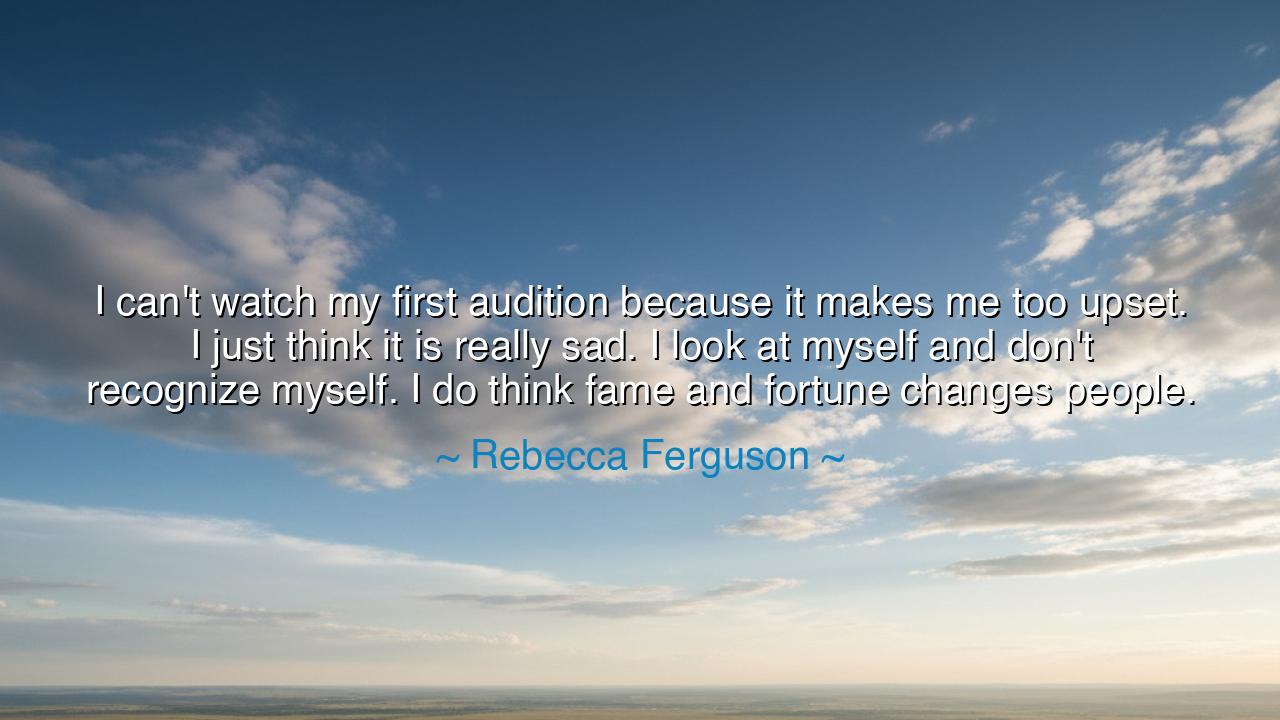
I can't watch my first audition because it makes me too upset. I
I can't watch my first audition because it makes me too upset. I just think it is really sad. I look at myself and don't recognize myself. I do think fame and fortune changes people.






Hear now the lament of the artist, voiced through the words of Rebecca Ferguson: “I can't watch my first audition because it makes me too upset. I just think it is really sad. I look at myself and don't recognize myself. I do think fame and fortune changes people.” These words carry not only the sorrow of one soul but the eternal warning to all who walk upon the path of glory. In them lies the recognition that fame, like a blazing fire, does not merely warm the hands but also consumes the flesh. To gaze back upon the self before transformation is to see innocence lost, as though a river has swept away the tender soil of youth and replaced it with stone.
The ancients spoke often of such transformations. In the halls of Rome, gladiators once entered the arena with trembling hearts, knowing not that the crowd’s roar would carve them into legends but also shatter the quiet men they once were. They too, like Ferguson, might not have recognized the boy who first stepped into training. Fortune, gilded though it may be, leaves a heavy mark, and the heart—made of softer things—bears its scars. When Rebecca confesses that she cannot look upon her younger self, it is the cry of one who feels that a mirror no longer tells the truth, for the mirror now reflects a stranger.
This sorrow is not only hers. Recall the story of Michael Jackson, a boy who sang with the innocence of dawn. His voice was once pure as a child’s prayer, but the great weight of fame twisted his image until he could not bear the reflection of his own face. The man no longer knew the boy. Such is the cruel price of a world that exalts its heroes too high—where the pedestal becomes a prison. Here, Ferguson speaks as a witness: that we, too, might be wary when the crowd’s applause begins to echo in our ears.
Yet within her words, there is not only grief but wisdom. She does not say that fame is evil, nor that fortune is a curse. Instead, she reveals that these forces are transformative, as fire is to metal. Some emerge sharpened, tempered, and strong. Others become brittle, losing the shape of who they once were. To watch her first audition is to witness the raw ore of her being, before it was forged by the heat of the world. That innocence cannot return, and the sight of it brings tears—tears not of shame, but of mourning.
Let us take from this the lesson of self-guarding. For what is the use of gain if it costs the soul? The great teacher Socrates warned that one must first “know thyself.” Ferguson’s sorrow arises because the “self” she once knew lies buried under the weight of public eyes. We must therefore anchor ourselves in virtues deeper than fame, in friendships that remind us of our true face, in quiet moments that preserve our soul from dissolution. Recognition of the self is the truest wealth, greater than all treasures and brighter than the applause of the multitude.
There is also strength in her confession, for she admits vulnerability without shame. Many would hide such sorrow, fearing it would weaken their image. But to speak thus is an act of courage. The ancients would have called this parrhesia—truth spoken boldly, even when it wounds. In her honesty, she gives us a mirror by which we may check our own lives. Where have we allowed fortune to shape us into strangers? What parts of ourselves have we lost to ambition, or to the unrelenting judgment of others?
Practical wisdom flows from this: seek always to return to your roots. Write letters to your younger self, and ask if they would know you still. Keep close those who loved you before success, for they remember the face that fame cannot alter. Find spaces of silence, far from the crowd, and let your heart speak without disguise. Fame and fortune may change us, but let them refine, not destroy. Let them polish the gold, not burn away the soul.
And so, the teaching stands: guard your selfhood as a sacred flame. Accept that change will come, as river shapes stone, but do not lose recognition of your own reflection. For the saddest tragedy is not failure, nor even suffering—it is to succeed so greatly that you no longer know who you are. Walk humbly, walk wisely, and let the applause of the world never drown the quiet voice within. This is the path to a life that remains whole, even beneath the blazing fire of destiny.






AAdministratorAdministrator
Welcome, honored guests. Please leave a comment, we will respond soon